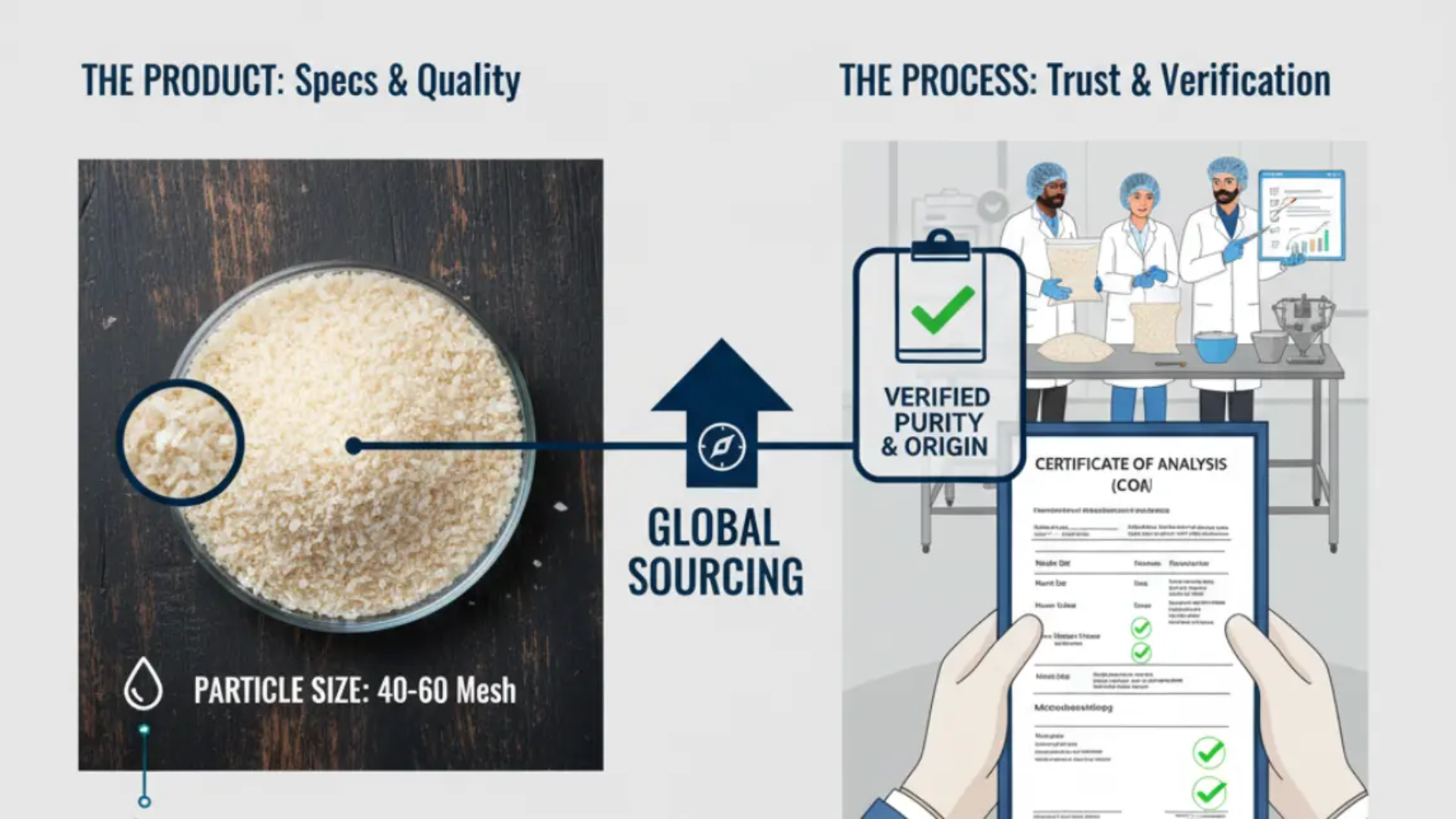In the global food ingredient industry, precision is paramount. For spice importers and food manufacturers, sourcing the right ingredient goes beyond just flavour—it’s about getting the exact particle size, texture, and functionality your product requires. In the world of dehydrated vegetables, Dehydrated White Onion Granules are a versatile workhorse, but procuring a high-quality, consistent supply requires a keen eye for detail.
This guide is designed for importers and bulk buyers. As an experienced exporter sourcing from India, we’ll walk you through the critical quality markers you must look for to ensure every shipment meets the highest international standards.
1. Particle Size (Mesh): The Defining Characteristic
The first and most important specification is the particle size. The key difference between onion powder, granules, and minced onion lies in how finely the dehydrated white onion is ground.
Dehydrated White Onion Granules typically fall within a specific mesh size range, most commonly 40-60 mesh. This is coarser than powder but finer than minced onion. Why does this matter?
For Spice Blends: This particle size is ideal for dry rubs and seasoning blends. It mixes evenly with other ground spices of a similar size (like black pepper or garlic powder), ensuring a homogenous blend without the risk of clumping that a fine powder might present.
For Texture: It provides a slight, pleasant texture in dressings and sauces without being chunky.
2. Colour and Appearance: A Visual Sign of Quality
Before you even test the flavour, the appearance of the granules provides crucial clues about its quality. Export-quality onion granules should be a uniform, creamy to off-white colour.
What to look for:
Consistency: The colour should be even throughout the batch.
Minimal Specks: While a few dark specks are normal, a high number can indicate impurities or the use of lower-grade raw onions.
What to avoid:
Browning or Yellowing: This is a sign of scorching or caramelization during the dehydration process, which can impart a burnt or overly sweet taste.
Greyish Tints: This can indicate poor quality raw material or improper storage.
Spice Up Your Business with Authentic Indian Flavors
Import and Export Excellence from India!

3. Moisture Content: The Key to Flowability and Shelf Life
For any dehydrated product, moisture is the enemy. It is the primary cause of caking, clumping, and microbial spoilage. For bulk onion granules, low moisture content is essential for two key industrial functions:
Shelf Life: A moisture content of below 6% is the standard for export-grade product, guaranteeing a stable shelf life of 18-24 months.
Flowability: This low moisture ensures the granules remain “free-flowing,” a critical property for automated dosing and packaging machinery in a factory setting.
4. Purity and Origin: Sourcing with Confidence
The highest quality product contains only one ingredient: 100% pure white onion. When sourcing, especially for “clean label” applications, ensure the product is free from fillers, salt, or undeclared anti-caking agents.
The origin of the raw material is also a key quality indicator. Sourcing from India, particularly from the Nashik region, provides access to some of the world’s most pungent and flavourful white onions, which translates directly into a more potent and aromatic final product. A trustworthy onion granules supplier will be transparent about the origin and purity of their product.
5. The Right Tool for the Job: Granules vs. Powder
Understanding when to use granules versus powder is key to perfect product formulation. They are two essential but different tools.
Choose Onion Granules when: Your application requires some texture, you are creating a dry seasoning blend that needs to resist clumping, or you want a slower, more controlled flavour release. They are perfect for rubs, dressings, and general-purpose seasoning shakers.
Choose Onion Powder when: Your application demands a completely smooth texture and instant flavour dispersion. Onion powder is the ideal choice for creamy sauces, liquid marinades, smooth gravies, and instant soup broths.
Often, manufacturers use both—powder to create the foundational flavour base and granules to add a layer of texture and visual appeal.
Spice Up Your Business with Authentic Indian Flavors
Import and Export Excellence from India!

6. The Final Check: The Certificate of Analysis (COA)
Never commit to a bulk order without the guarantee of a batch-specific Certificate of Analysis (COA). This is the importer’s ultimate document of proof. A comprehensive COA from a reputable supplier will verify all the critical dehydrated onion specifications, including:
Exact Particle Size (Mesh Analysis)
Precise Moisture Percentage
Microbiological Safety Data (confirming it’s free from pathogens)
Purity Confirmation
By using this checklist, importers can move beyond simple price comparisons and make informed decisions based on quality, functionality, and safety.
Frequently Asked Questions (FAQs)
1. What does “40-60 mesh” actually mean for onion granules?
“Mesh” refers to the number of openings per linear inch of a screen. A 40-60 mesh means the particles will pass through a screen with 40 openings per inch but will be retained by a screen with 60 openings per inch. This controls the particle size to a specific range.
2. Is there a taste difference between onion granules and powder?
The base flavour is the same, but the perception can be different. Powder provides an immediate, intense flavour release due to its large surface area. Granules release their flavour a bit more slowly and can provide a subtle “burst” of flavour when the particle is hydrated.
3. How can I test the flowability of a sample?
A simple test is to pour the granules from one container to another. They should flow smoothly and evenly, like sand, without sticking together or forming large clumps.
4. Should I avoid onion granules with anti-caking agents?
Not necessarily. A small, declared amount of a food-grade anti-caking agent (like Silicon Dioxide) is common and acceptable in the industry to ensure flowability. The key is transparency from your supplier. However, the best granules achieve this primarily through low moisture content.
5. How do granules hold up in a liquid application like a salad dressing?
They perform excellently. They will partially rehydrate, becoming soft specks that add visual appeal and a pleasant texture, but they won’t fully dissolve or make the dressing cloudy like a powder might.
6. What is the rehydration ratio for onion granules?
Generally, 1 part of dehydrated onion granules will rehydrate to about 4 parts of fresh onion by weight.
7. Is there a colour difference between granules made from white vs. yellow onions?
Yes. Dehydrated White Onion Granules have a clean, off-white colour. Granules from yellow onions will have a more yellowish or toasted appearance and a slightly sweeter flavour profile.
8. Why is sourcing from an Indian onion granules supplier a good choice?
India is a world leader in onion production, particularly the pungent varieties ideal for dehydration. Experienced suppliers in India have sophisticated manufacturing processes and a deep understanding of the quality standards required for the global market.
About us
We bridge the gap between local producers and global markets, ensuring seamless trade facilitation with exceptional quality and reliability. We provide quick delivery services with customized packaging with all approval of International Certificates (Spices board India, MSME, IEC, fssai, FIEO, APEDA, EU certification, FDA and Many More)
Contact us
Shop No. 3, Ganesh Prestige Sr. No. 2/15, Near Laxmi Jewellers, Dhanakawadi, Pune – 411043, Maharashtra INDIA.
Call On
+91 9545205050
+91 9822422584



Leave A Comment